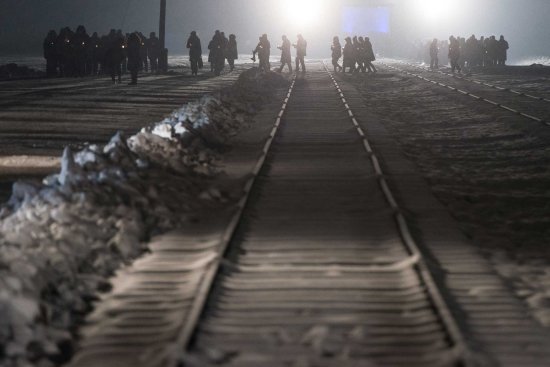
Primo Levi's account of his arrival at the death camp
Seventy years ago today, Soviet troops liberated the Auschwitz concentration camp in German-occupied southern Poland where, from 1942 on, the Nazis killed at least 960,000 Jews, 74,000 Poles, 21,000 Roma (Gypsies), 15,000 Soviet prisoners of war, and 10,000-15,000 others. Most were killed in gas chambers designed and constructed for the purpose.
In February 1944, less than a year before the liberation, the Italian chemist Primo Levi arrived at the camp with more than 600 other Jews who had been deported from German-occupied Italy in sealed train cars. In all, some 10,000 Jews were deported to concentration and extermination camps from Italy after the German occupation in September 1943.
Following is Levi’s account of the selection process by means of which the Nazis determined who would be killed and who would be kept alive for slave labor, from Survival in Auschwitz, (Simon and Schuster):
[time-brightcove not-tgx=”true”]The climax came suddenly. The door opened with a crash, and the dark echoed with outlandish orders in that curt, barbaric barking of Germans in command which seems to give vent to a millennial anger. A vast platform appeared before us, lit up by reflectors. A little beyond it, a row of lorries. Then everything was silent again. Someone translated: we had to climb down with our luggage and deposit it alongside the train. In a moment the platform was swarming with shadows. But we were afraid to break that silence: everyone busied himself with his luggage, searched for someone else, called to somebody, but timidly, in a whisper.
A dozen SS men stood around, legs akimbo, with an indifferent air. At a certain moment they moved among us, and in a subdued tone of voice, with faces of stone, began to interrogate us rapidly, one by one, in bad Italian. They did not interrogate everybody, only a few: ‘How old? Healthy or ill?’ And on the basis of the reply they pointed in two different directions.
Everything was as silent as an aquarium, or as in certain dream sequences. We had expected something more apocalyptic: they seemed simple police agents. It was disconcerting and disarming. Someone dared to ask for his luggage: they replied, ‘luggage afterwards’. Someone else did not want to leave his wife: they said, ‘together again afterwards’. Many mothers did not want to be separated from their children: they said ‘good, good, stay with child’. They behaved with the calm assurance of people doing their normal duty of every day. But Renzo stayed an instant too long to say good-bye to Francesca, his fiancée, and with a single blow they knocked him to the ground. It was their everyday duty.
In less than ten minutes all the fit men had been collected together in a group. What happened to the others, to the women, to the children, to the old men, we could establish neither then nor later: the night swallowed them up, purely and simply. Today, however, we know that in that rapid and summary choice each one of us had been judged capable or not of working usefully for the Reich; we know that of our convoy no more than ninety-six men and twenty-nine women entered the respective camps of Monowitz-Buna and Birkenau, and that of all the others, more than five hundred in number, not one was living two days later…
This is the reason why three-year-old Emilia died: the historical necessity of killing the children of Jews was self-demonstrative to the Germans. Emilia, daughter of Aldo Levi of Milan, was a curious, ambitious, cheerful, intelligent child; her parents had succeeded in washing her during the journey in the packed car in a tub with tepid water which the degenerate German engineer had allowed them to draw from the engine that was dragging us all to death.
Thus in an instant, our women, our parents, our children disappeared. We saw them for a short while as an obscure mass at the other end of the platform; then we saw nothing more.
[The United States Holocaust Memorial Museum]
Auschwitz Survivors Mark 70th Anniversary of Camp’s Liberation







Read next: Eva Kor: What It Was Like to Be Experimented on During the Holocaust